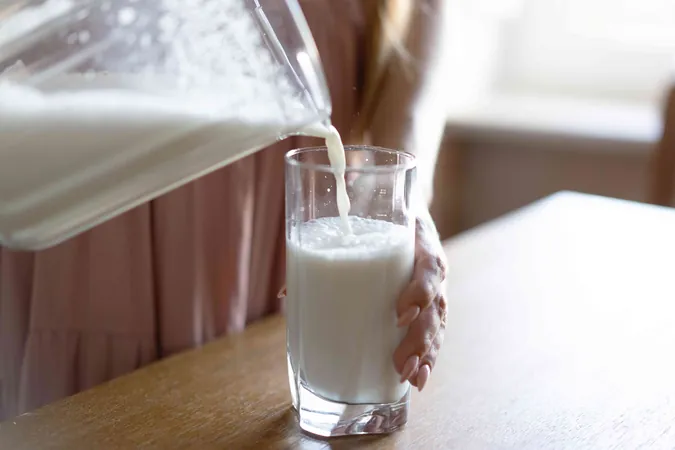
Groundbreaking Study: Just One Glass of Milk a Day Could Slash Women's Colorectal Cancer Risk by 17%!
2025-01-17
Author: Jia
Groundbreaking Study: Just One Glass of Milk a Day Could Slash Women's Colorectal Cancer Risk by 17!
In a striking revelation, a recent study published in Nature Communications has shown that women who consume a daily glass of milk could significantly reduce their risk of colorectal cancer. This study shines a light on the important role dietary choices play in cancer prevention, particularly in a world where colorectal cancer now ranks as the fourth leading cause of cancer death among women.
Colorectal cancer, a troubling condition that develops in the colon or rectum, is increasingly being diagnosed in individuals under the age of 65. The study indicates that an intake of 300 milligrams of calcium daily—from food sources such as an 8-ounce glass of milk—correlates with a remarkable 17% reduction in colorectal cancer risk in women.
Dr. Keren Papier, the senior nutritional epidemiologist at the University of Oxford who led the research, stated, “Calcium's protective effects were observed from both dairy and non-dairy sources.” However, she cautioned that the impact of calcium supplements is still uncertain and may not deliver the same benefits as natural food sources.
The study's findings come at a crucial time when more attention is being focused on diet as a significant factor in colorectal cancer development. Dr. Christopher Lieu, co-director of gastrointestinal medical oncology at the University of Colorado School of Medicine, emphasized that this research adds to the evolving knowledge about diet's influence on cancer risk.
A Deep Dive Into Dietary Habits
This landmark study is one of the largest examinations of the link between diet and colorectal cancer yet, analyzing the dietary habits of over 540,000 women in the U.K., part of the Million Women Study, which has surveyed participants over a staggering 16-year period. By evaluating 97 dietary factors—including dairy and red meat consumption—the researchers identified the correlation between calcium intake and colorectal cancer risk.
By employing a method known as Mendelian Randomization, the researchers aimed to clarify the connection between calcium and disease risk, effectively reducing the chances of confounding variables skewing the results. Dr. Veronika Fedirko, a molecular cancer epidemiologist at MD Anderson Cancer Center, remarked that the findings are especially encouraging because they could establish a clear relationship between higher calcium consumption and lower colorectal cancer risks.
The consensus from prior studies suggests that calcium aids in attaching to bile acids and free fatty acids in the colon—this interaction helps mitigate their potentially cancer-causing properties. Additionally, calcium is thought to regulate cellular processes that contribute to tumor development.
Broader Implications for Diet
While increasing calcium intake is pivotal, experts warn that it should not be the sole focus. Dr. Papier points out that a well-rounded diet remains essential: “We advocate for an overall healthy dietary pattern, not just an increase in calcium.
Dr. Fedirko echoed these sentiments, stressing the importance of a holistic approach that considers other factors, like reducing alcohol consumption, increasing fiber intake, and maintaining a balanced diet. Emerging research suggests that diets low in processed foods and red meats while being rich in whole grains, vegetables, and fruits can contribute significantly to lowering colorectal cancer risk.
Moreover, adopting lifestyle changes—such as quitting smoking, managing body weight, and keeping up with cancer screenings—could further enhance cancer prevention strategies. These findings signal a compelling opportunity for women to revisit their dietary choices and promote a healthier lifestyle that could yield significant protective benefits against colorectal cancer.
This groundbreaking research not only emphasizes the power of a single daily glass of milk but ignites a broader conversation about the intersection of diet, lifestyle, and cancer prevention. As we delve deeper into nutrition's role in health, knowledge truly becomes power. Don't miss out on these life-saving insights!




 Brasil (PT)
Brasil (PT)
 Canada (EN)
Canada (EN)
 Chile (ES)
Chile (ES)
 Česko (CS)
Česko (CS)
 대한민국 (KO)
대한민국 (KO)
 España (ES)
España (ES)
 France (FR)
France (FR)
 Hong Kong (EN)
Hong Kong (EN)
 Italia (IT)
Italia (IT)
 日本 (JA)
日本 (JA)
 Magyarország (HU)
Magyarország (HU)
 Norge (NO)
Norge (NO)
 Polska (PL)
Polska (PL)
 Schweiz (DE)
Schweiz (DE)
 Singapore (EN)
Singapore (EN)
 Sverige (SV)
Sverige (SV)
 Suomi (FI)
Suomi (FI)
 Türkiye (TR)
Türkiye (TR)
 الإمارات العربية المتحدة (AR)
الإمارات العربية المتحدة (AR)